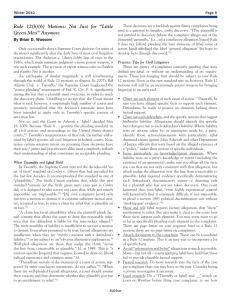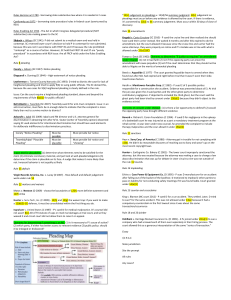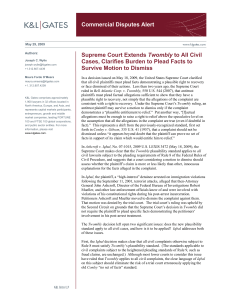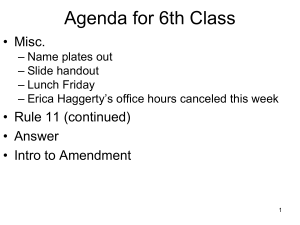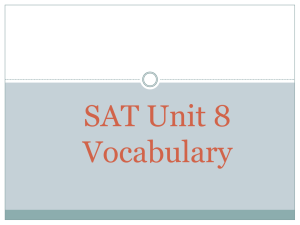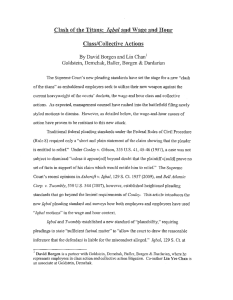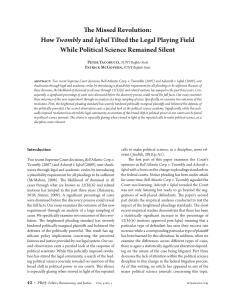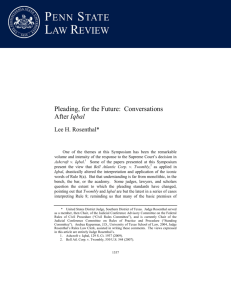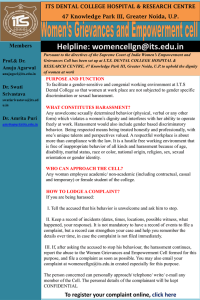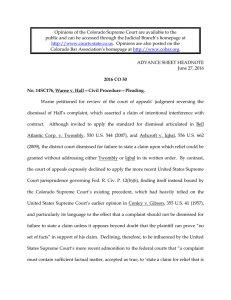The Well-Pleaded Complaint Rule and Criminal Indictments: Why no
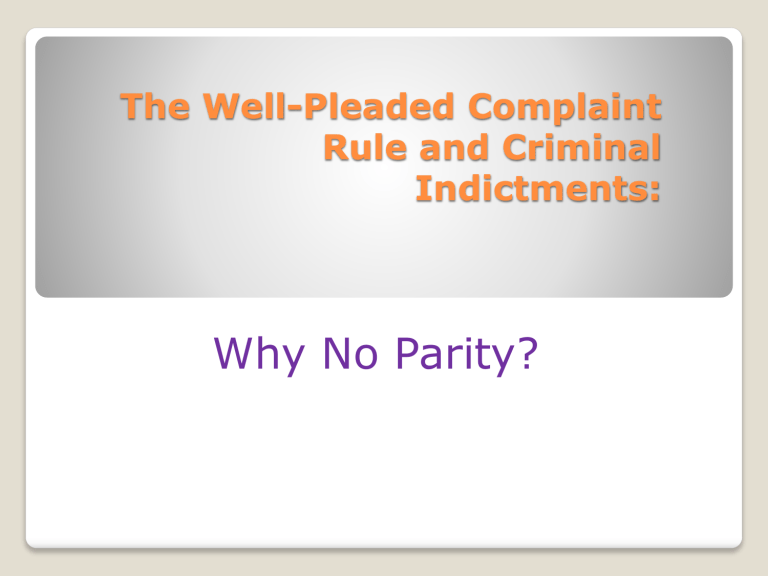
The Well-Pleaded Complaint
Rule and Criminal
Indictments:
Why No Parity?
Jolly good shot,
Chauncey!
Return with me to a day in the life of a civil practitioner…
Federal Rule of Civil Procedure 8
Rule 8. General Rules of Pleading
(a) CLAIM FOR RELIEF. A pleading that states a claim for relief must contain:
(2) a short and plain statement of the claim showing that the pleader is entitled to relief;
The Well-Pleaded Complaint
Rule:
“[T]he accepted rule [is] that a complaint should not be dismissed for failure to state a claim unless it appears beyond doubt that the plaintiff can prove no set of facts in support of his claim which would entitle him to relief.”
The Well-Pleaded Complaint
Rule:
Conley v. Gibson, 355 U.S. 41,
47, 78 S. Ct. 99, 2 L.Ed.2d 80
(1957).
ALONG COMES TWOMBLY
AND IQBAL
ALONG COMES TWOMBLY
AND IQBAL and, no, these are not new midway games at the State Fair.
BELL ATLANTIC CORP. V. TWOMBLY
550 U.S. 544 (2007).
Sherman Anti-Trust class-action civil conspiracy case.
Revenge of the “Baby Bells.”
BELL ATLANTIC CORP. V. TWOMBLY
Conley’s “no set of facts” language is “retired.”
The phrase “is best forgotten as an incomplete, negative gloss on an accepted pleading standard: once a claim has been stated adequately, it may be supported by showing any set of facts consistent with the allegations in the complaint.”
BELL ATLANTIC CORP. V. TWOMBLY
A party’s allegation “requires more than labels and conclusions, and a formulaic recitation of the elements of a cause of action will not do.”
BELL ATLANTIC CORP. V. TWOMBLY
On a motion to dismiss, courts “are not bound to accept as true a legal conclusion couched as a factual allegation.” Papasan v. Allain, 478
U.S.265, 286 (1986).
ASHCROFT V. IQBAL
556 U.S. 662 (2009).
Bivens action filed against AG Ashcroft and FBI
Director Mueller for unlawful detention without charges following 9-11 terrorists attacks.
ASHCROFT V. IQBAL
Twombly re-affirmed. Plus, a complaint does not suffice “if it tenders naked assertions devoid of further factual enhancement.”
ASHCROFT V. IQBAL
To survive a motion to dismiss, a complaint must “state a claim to relief that is plausible on its face.”
“The plausibility standard is not akin to a probability standard but it asks for more than a sheer possibility that a defendant has acted unlawfully.”
Oh Giles, fetch us some tea.
Return with me to a day in the life of a civil practitioner…
Federal Rule of Civil Procedure 8
General Rules of Pleading, subsection (a)(2) governing claims for relief requires:
--a short and plain statement of the claim showing that the pleader is entitled to relief.
Federal Rule of Criminal
Procedure 7
Rule 7(c)(1) mandates that indictments contain a:
“definite written statement of the essential facts constituting the offense charged[.]”
The pedigree of the pleading requirement.
The Indictment Must
Allege Facts
“Lest there remain any doubt about the constitutional stature of the reasonable-doubt standard, we explicitly hold that the Due Process Clause protects the accused against conviction except upon proof beyond a reasonable doubt of every fact necessary to constitute the crime with which he is charged .”
In re Winship, 397 U.S. 358, 364 (1970).
The Indictment Must
Allege Facts
“any fact (other than prior conviction) that increases the maximum penalty for a crime must be charged in an indictment, submitted to a jury, and proven beyond a reasonable doubt.”
Apprendi v. New Jersey, 530 U.S. 466, 476 (2000).
The Indictment Must
Allege Facts
Apprendi rule applied to facts subjecting a defendant to the death penalty.
Ring v. Arizona, 536 U.S. 584 (2002).
The Indictment Must
Allege Facts
Apprendi rule applied to facts permitting a sentence in excess of the “standard range” under Washington's
Sentencing Reform Act.
Blakely v. Washington, 542 U.S. 296 (2004).
The Indictment Must
Allege Facts
Apprendi rule applied to facts triggering a sentence range elevation invalidated the mandatory nature of the Federal
Sentencing Guidelines.
Booker v. United States, 543 U.S. 220 (2005).
The Indictment Must
Allege Facts
Apprendi rule applied to facts which exposed a defendant to an elevated upper term under California’s Determinate
Sentencing Law.
Cunningham v. California, 549 U.S. 270 (2007).
The Indictment Must
Allege Facts
The Well-Pleaded Complaint
Rule and Criminal
Indictments:
Why is this important?
On or about April 13,
2012, in Buncombe
County, within the
Western District of North
Carolina, the defendant, knowingly possessed a firearm, a Walther model
PPK/S, semi-automatic
.380 caliber pistol, in furtherance of a drug trafficking crime for which he may be prosecuted in a court of the United States, that is possession with intent to distribute and dispensing and distributing a controlled substance.
A party’s allegation
“requires more than labels and conclusions, and a formulaic recitation of the elements of a cause of action will not do.”
On or about April 13,
2012, in Buncombe
County, within the
Western District of North
Carolina, the defendant, knowingly possessed a firearm, a Walther model
PPK/S, semi-automatic
.380 caliber pistol, in furtherance of a drug trafficking crime for which he may be prosecuted in a court of the United States, that is possession with intent to distribute and dispensing and distributing a controlled substance.
On a motion to dismiss, courts “are not bound to accept as true a legal conclusion couched as a factual allegation.”
On or about April 13,
2012, in Buncombe
County, within the
Western District of North
Carolina, the defendant, knowingly possessed a firearm, a Walther model
PPK/S, semi-automatic
.380 caliber pistol, in furtherance of a drug trafficking crime for which he may be prosecuted in a court of the United States, that is possession with intent to distribute and dispensing and distributing a controlled substance.
A pleading does not suffice “if it tenders naked assertions devoid of further factual enhancement.”
On or about April 13,
2012, in Buncombe
County, within the
Western District of North
Carolina, the defendant, knowingly possessed a firearm, a Walther model
PPK/S, semi-automatic
.380 caliber pistol, in furtherance of a drug trafficking crime for which he may be prosecuted in a court of the United States, that is possession with intent to distribute and dispensing and distributing a controlled substance.
To survive a motion to dismiss, a pleading must
“state a claim to relief that is plausible on its face.”
And, the “plausibility standard is not akin to a probability standard but it asks for more than a sheer possibility that a defendant has acted unlawfully.”
The Well-Pleaded Complaint
Rule and Criminal
Indictments:
Won’t the “discovery” bring complete clarity?
TWOMBLY & IQBAL
“It is no answer to say that a claim just shy of a plausible entitlement to relief can, if groundless, be weeded out early in the discovery process[.]”
Twombly, 550 U.S. at 559.
TWOMBLY & IQBAL
“We decline respondent's invitation to relax the pleading requirements on the ground that … minimally intrusive discovery[]” is the answer.
Iqbal, 556 U.S. at 686.
